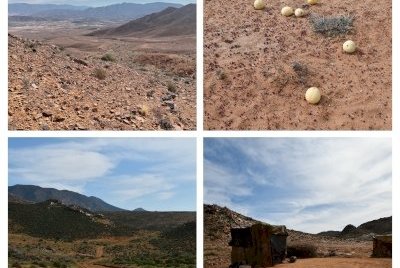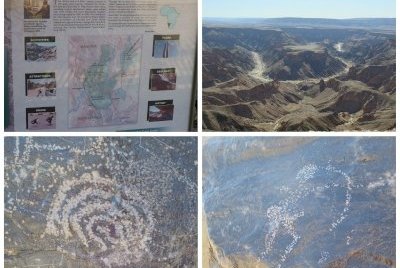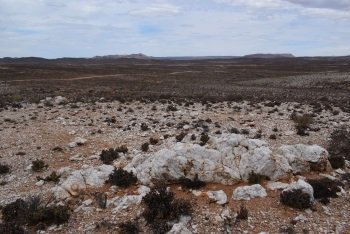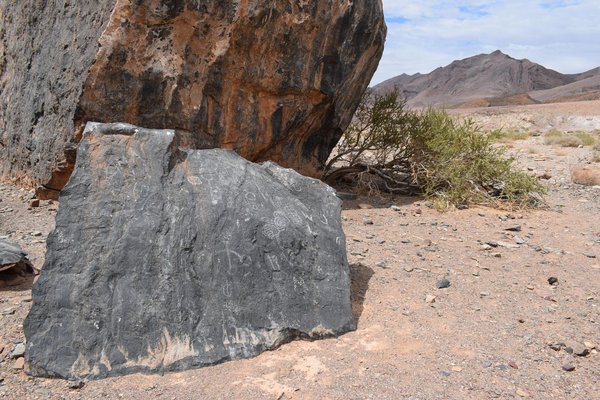South Africa
Richtersveld
The Richtersveld Cultural and Botanical Landscape reflects the transhumance lifestyle of the Nama pastoralists.
The area is located in a mountainous desert in the north-west part of South Africa and is characterized by its succulent Karoo vegetation. It is the home ground of the indigenous Nama people - descendants of the Khoi-Khoi. The site includes the seasonal migrations and grazing grounds, stock posts (kraals) and haru oms, the portable houses of the Nama.
Community Perspective: the botanical aspect of the site is more obvious than the cultural. The most common way of access is from Vioolsdrift by a tour or 4x4 self-drive. Svein has described his adventures reaching it from Sendelingsdrift.
Site Info
Official Information
- Full Name
- The Richtersveld Cultural and Botanical Landscape (ID: 1265)
- Country
- South Africa
- Status
-
Inscribed 2007
Site history
History of Richtersveld
- 2007: Inscribed
- Inscribed
- Type
- Cultural
- Criteria
- iv
- v
Links
- UNESCO
- whc.unesco.org
- Official
-
- sanparks.org — Richtersveld park site
- Related
-
- richtersveldwhs.org — Richtersveld WHS site
- en.wikipedia.org — Wiki on Richtersveld
All Links
UNESCO.org
- whc.unesco.org — whc.unesco.org/
Official Website
- sanparks.org — Richtersveld park site
Related Resources
- richtersveldwhs.org — Richtersveld WHS site
- en.wikipedia.org — Wiki on Richtersveld
News Article
- July 1, 2007 afrol.com — The story behind how South Africa got Richtersveld included as a cultural WHS
- July 1, 2007 int.iol.co.za — The Richtersveld in the Northern Cape has been awarded world heritage status.
Community Information
- Community Category
- Cultural Landscape: Continuing
Travel Information
Recent Connections
-
Perfect Inscriptions
2007 -
Largest cultural WHS
160,000 ha -
Customary ownership
The Richtersveld Conservancy is owned b…
Connections of Richtersveld
- Geography
-
-
On National Border
On Namibia border
-
- Trivia
-
-
Largest cultural WHS
160,000 ha -
Customary ownership
The Richtersveld Conservancy is owned by the local community through a Community Property Association (AB ev) -
Minority communities
Nama people continue to live and graze their livestock in the area
-
- Ecology
-
-
Ratites
common ostrich
-
- World Heritage Process
-
-
Cultural sites rejected for Natural criteria
In 2007 S Africa asked for inscription under natural criteria ix and x as well as cultural iv and v but this aspect was deferred as IUCN was concerned that the site wasn't large enough to meet the conditions of integrity and biodiversity -
Perfect Inscriptions
2007
-
- Human Activity
-
-
Pastoralism
This site sustains the semi-nomadic pastoral livelihood of the Nama people (AB ev)
-
- WHS on Other Lists
-
-
World Monuments Watch (past)
(2006, 2004)
-
- Timeline
-
-
Built in the 15th century
Written records on the Nama people in this area exist from the 15th century. Possibly arrived earlier, but no evidence found when.
-
News
- afrol.com 07/01/2007
- The story behind how South Africa …
- int.iol.co.za 07/01/2007
- The Richtersveld in the Northern C…
Community Reviews
Show full reviews
This site defines why I’m in this “game”! Totally remote and so different from my home environment! It’s the feeling of being on another planet! It’s just awesome!
Richtersveld is the most remote corner of South Africa, bordering probably the most remote corner of Namibia. From any direction it’s a long drive. Coming from the Kgalagadi Transfrontier Park we chose to approach Richtersveld Transfrontier Park through Namibia visiting Fish River Canyon on the way. We had decided to spend some time in the Sendelingsdrift Rest Camp, but as we hadn’t booked anything upfront, we planned to do it along the way. That was a good idea if it hadn’t been for the fact that our South African sim card didn’t work in Namibia nor in Kgalagadi. Anyway, we planned to arrive early and could do the booking in the camp reception, but there were some “obstacles”. Southbound in Namibia we had to buy food for two nights in a self-service camp, a stop in Aussenkehr was necessary (it’s just half an hour north of the river crossing ay Vioolsdrift). From there we followed the C13 road along the border on the Namibian side to the border crossing at Sendelingsdrift. A small cable ferry would take us across the Oranje river. The border post just 100 metres from the river was deserted! Strange, but we continued to the river finding the ferry on the other side. This place was totally deserted too. After waiting half an hour, we got in …
Keep reading 0 comments
To visit the park I stayed at the Vioolsdrift Lodge just across the border from Namibia. At the time it was run by a lovely family so I highly recommend it, great tents and a bar where you wouldn't expect one. The lady (formerly German I believe) also gave me superb info on the park and since I had a 4x4 on the trip I could access the park from a little road that goes northwest along the river. What you see are some low cliffs but the road is very shoddy, with big spiky rocks all over the place. It gets rougher as you go along. This may not be the main path into the park. It takes quite a while to get into the park and then it's still a while to see more things that you are looking for. Unfortunately this is like a huge "open museum" and the things you are looking for could be anywhere in the park without a guide. So my advice: book something from Cape Town if you want the full cultural experience. Going in on your own is mainly just for rock art and some remains of old houses.
However, I think the ǀAi-ǀAis/Richtersveld Transfrontier Park has the same cultural relics and MUCH better scenery. I've included a pic of Fish Canyon, a true marvel, and you can hike in it too. The access is better, there are more things to see, and it's more beautiful. Currently on Namibia's tentative …
Keep reading 0 comments
I find it very flattering to be the first one to make a review for Richtersveld. I still wonder why it was not listed as a mixed site (cultural and natural) considering the unique biodiversity and way of floral survival that exist in that region. My friend and I went through Vioolsdrif, near the border to Namibia, where we spent two nights to tick this site off, to get to the core zone. After going through the mountains,and passing through numerous massive rocks with 4,000 yo ancient Nama carvings (as shown in the page's photo above), the landscape dramatically changes to the world of the succulents - actually, upon entering Northern Cape region, the fynbos ecosystem loses presence. On the site, it constantly made me wonder how the plants there survive knowing how little rain the place gets, let alone how it can continually support pastoral activities for thousands of years already. We visited various quartz fields (see photo with this review) where the most bizzare plants grow (the halfmansboom being the most iconic), as well as a goat pen and a water well made by the locals. In our 7 hours stay in that part of Richtersveld, we never saw any other tourists around, making the experience truly memorable for us. I also felt I earned some bragging rights in going here when our guide explained to us that there are only around 400-600 tourists who visit the site every year, as most would rather go to the white …
Keep reading 0 comments
